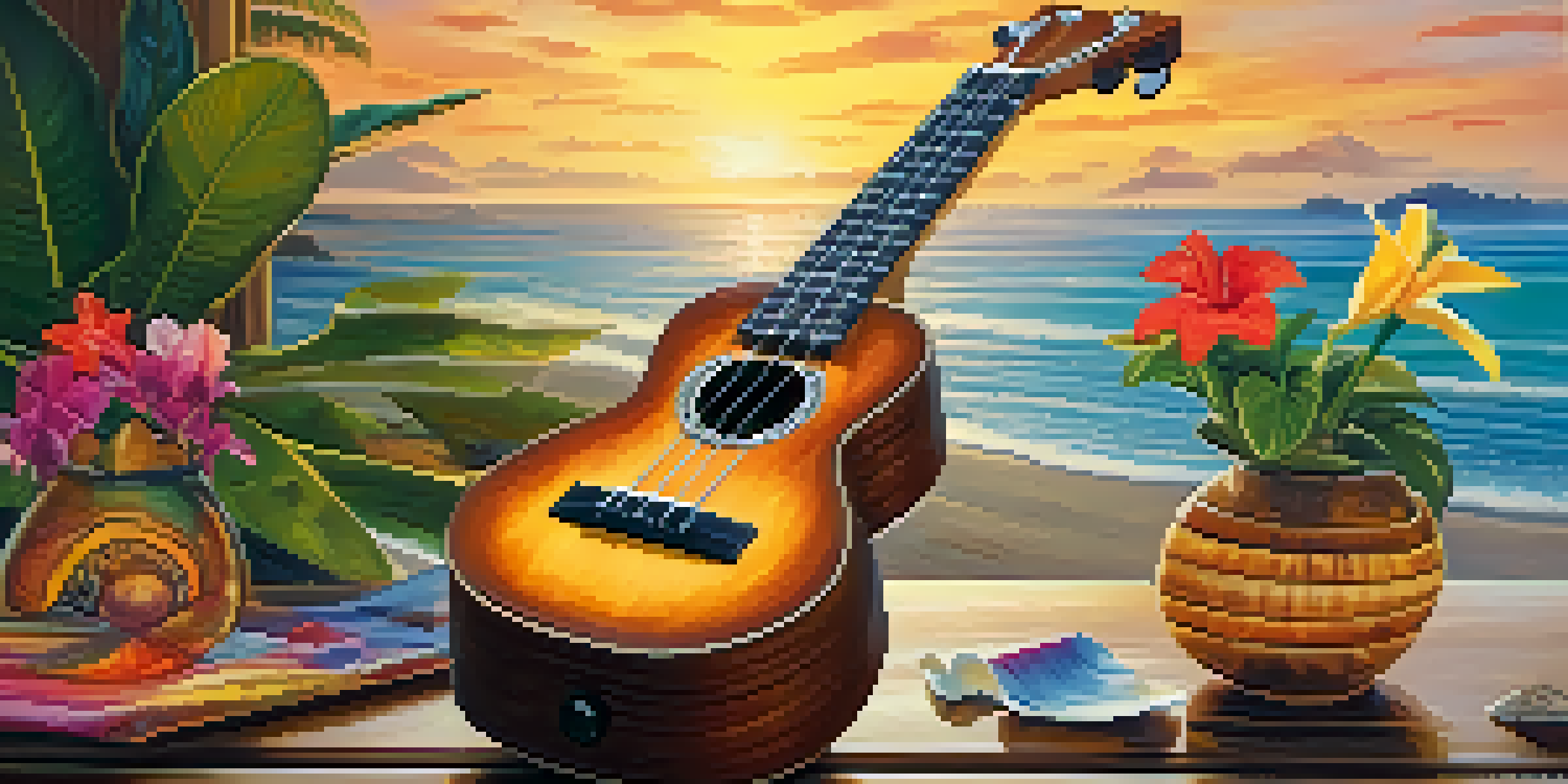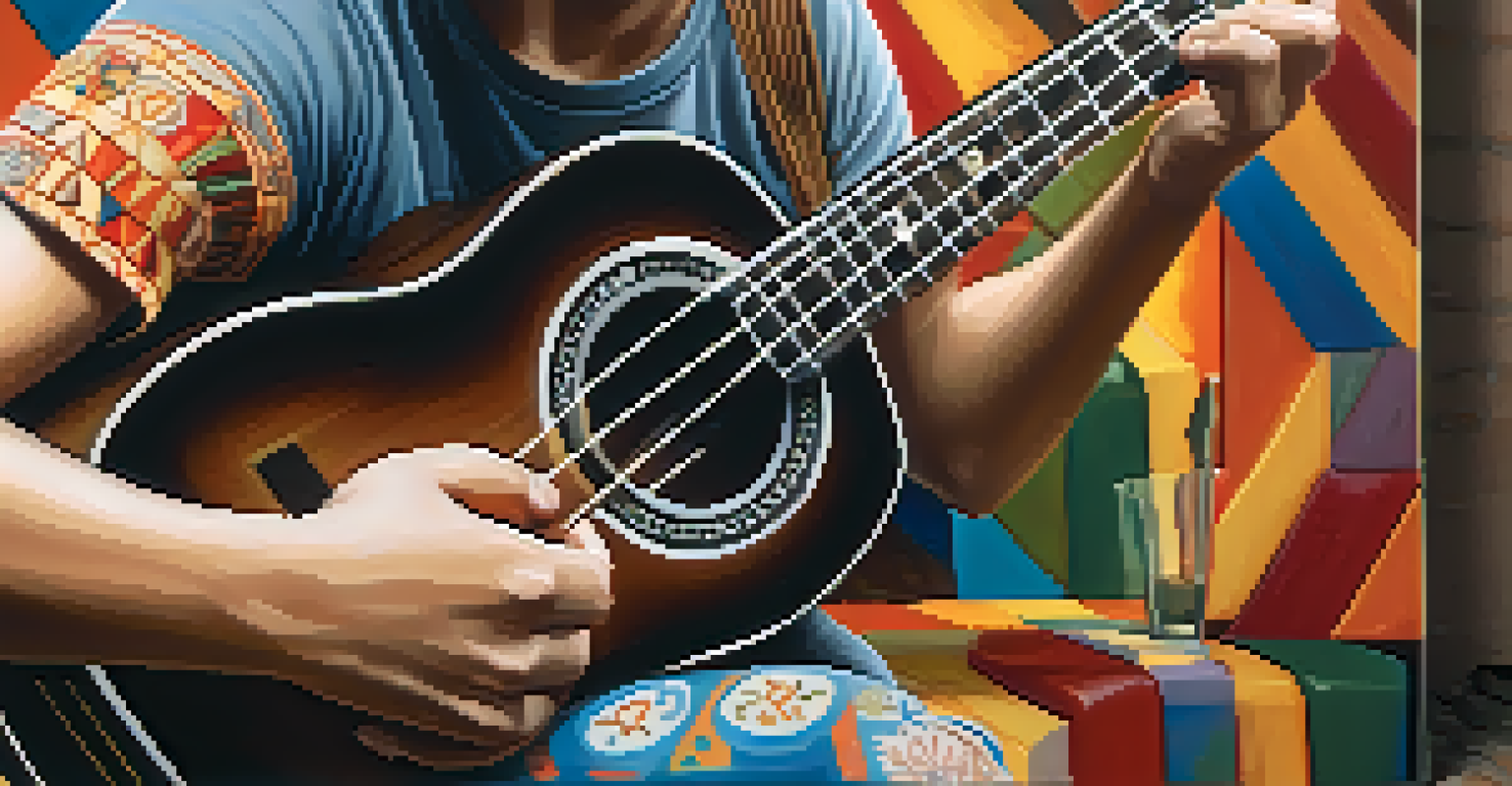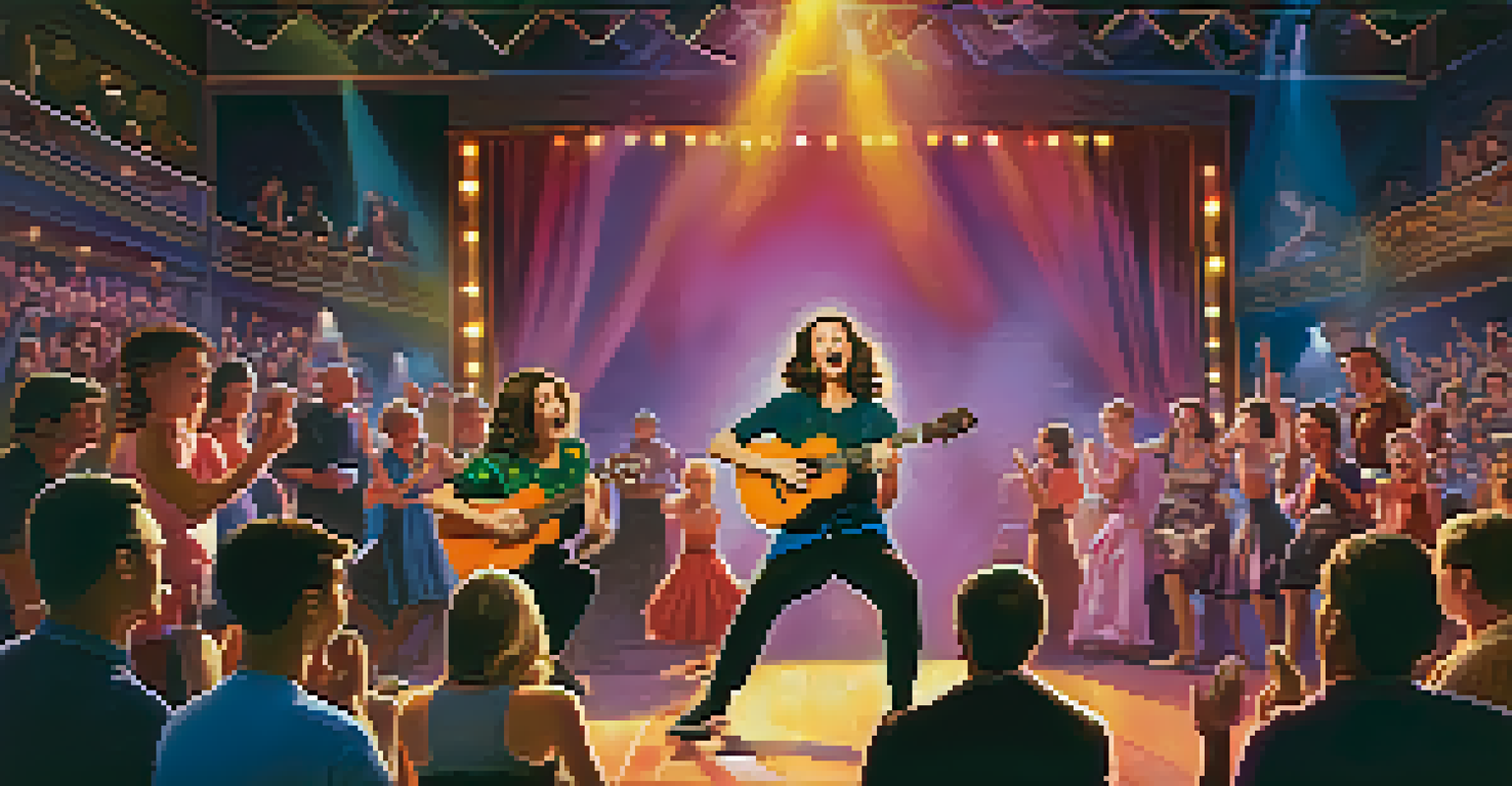The Ukulele in Musical Theatre: A Fresh Approach to Storytelling

The Ukulele: A Brief Introduction to Its Charm
The ukulele is often seen as a cheerful and approachable instrument, making it an ideal choice for storytelling in musical theatre. Its light, bright sound evokes a sense of playfulness that can easily capture the audience's attention. Originating from Hawaii, this four-stringed instrument has transcended cultural boundaries, finding its place in various musical genres, including musical theatre.
The ukulele is a joyful instrument; it brings people together through music and storytelling.
What sets the ukulele apart is its simplicity and versatility. With just a few chords, performers can create a multitude of emotions, from joy to nostalgia. This accessibility allows both seasoned musicians and novices to engage with the instrument, making it perfect for theatre productions that aim to connect with a wide audience.
Moreover, the visual appeal of the ukulele adds to its charm on stage. Its compact size and vibrant colors can enhance the overall aesthetic of a performance, drawing the audience in before a note is even played. This unique combination of sound and sight makes the ukulele a powerful storytelling tool in the world of musical theatre.
Bringing Characters to Life with the Ukulele
In musical theatre, a character's personality often shines through their musical choices. The ukulele serves as an expressive voice for characters, allowing them to convey their emotions in a relatable way. For instance, a quirky character may strum a lively ukulele tune that reflects their playful nature, instantly connecting with the audience.

The instrument can also serve as a storytelling device, providing background music that sets the scene or enhances a character's journey. Imagine a heartfelt solo performed on the ukulele that captures a character's struggle or triumph, pulling the audience deeper into the narrative. This ability to evoke emotion through simple melodies is what makes the ukulele a unique asset in theatre.
Ukulele's Role in Storytelling
The ukulele enhances storytelling in musical theatre through its expressive sound and ability to convey a character's emotions.
Moreover, the intimacy of the ukulele allows for personal storytelling. When a character plays the ukulele, it often feels like a direct conversation with the audience, fostering a sense of connection and empathy. This personal touch can transform a standard performance into a memorable experience, leaving a lasting impression.
The Ukulele's Role in Modern Musical Theatre
In recent years, the ukulele has carved out a significant niche in modern musical theatre. Shows like 'In the Heights' and 'Next to Normal' have incorporated the instrument, showcasing its versatility beyond traditional genres. This trend reflects a broader shift towards inclusivity and innovation in storytelling, inviting diverse musical influences into the spotlight.
Music is the shorthand of emotion, and the ukulele captures that essence beautifully in theatre.
Using the ukulele allows creators to experiment with sound and style, creating fresh musical landscapes that resonate with contemporary audiences. The upbeat, catchy tunes produced by the ukulele can easily become earworms, enhancing the overall memorability of a production. This innovative approach helps new works stand out in a crowded theatrical landscape.
Furthermore, the integration of the ukulele into musical theatre speaks to a growing appreciation for simplicity in storytelling. By stripping away complex arrangements, writers can focus on the emotional core of their narratives, making the stories more relatable and impactful. The ukulele embodies this ethos, proving that sometimes less is indeed more.
The Ukulele and Audience Engagement
One of the most compelling aspects of the ukulele in musical theatre is its ability to engage the audience in new ways. Performers can invite audience members to participate through sing-alongs or interactive segments, creating a sense of community within the theatre. This engagement can transform a passive viewing experience into an active celebration of music and storytelling.
The light-hearted nature of the ukulele also encourages a relaxed atmosphere, making the theatre feel more accessible to a wider audience. When the audience feels comfortable, they are more likely to connect with the story and characters on stage. This connection can lead to deeper emotional responses, making the performance more impactful.
Engaging Modern Audiences
Its interactive nature and light-hearted appeal foster audience engagement, making theatre more accessible and enjoyable.
Moreover, the ukulele's popularity on social media platforms has contributed to its appeal among younger audiences. As clips of ukulele performances go viral, they can draw in new theatre-goers who might not have previously considered attending a show. This modern marketing approach can help revitalize interest in musical theatre, ensuring its relevance in today's entertainment landscape.
Innovative Storytelling Techniques with the Ukulele
The ukulele has opened the door for innovative storytelling techniques within musical theatre. For example, some productions use the ukulele to create unique soundscapes that complement the narrative, enhancing the overall sensory experience. This approach allows directors and composers to push the boundaries of traditional musical theatre, introducing unexpected elements that captivate audiences.
Additionally, the ukulele's portability makes it an ideal instrument for site-specific performances, where the setting plays a key role in the storytelling. Imagine a show set on a beach, where the soothing sounds of the ukulele blend seamlessly with the natural environment, enhancing the authenticity of the narrative. This versatility can elevate a production to new heights, immersing the audience in the story.
Through its innovative use, the ukulele can also serve as a narrative device, representing themes or character arcs throughout the performance. A recurring ukulele motif can symbolize a character's growth or emotional journey, weaving a deeper thread throughout the narrative. This layer of complexity enriches the storytelling experience, encouraging audiences to engage with the material on multiple levels.
Cultural Influences of the Ukulele in Theatre
The ukulele is more than just an instrument; it carries with it a rich cultural history that can enhance storytelling in musical theatre. Its Hawaiian roots bring a sense of warmth and community, often reflecting themes of family and belonging. Integrating cultural elements into performances can deepen the connection between the story and the audience, fostering a greater appreciation for diversity.
Moreover, the ukulele's global presence allows for the blending of various musical styles, enriching the theatrical experience. From reggae to folk, the incorporation of different genres can create a unique sound palette that resonates with diverse audiences. This fusion not only showcases the versatility of the ukulele but also highlights the importance of inclusivity in storytelling.
Cultural and Musical Versatility
The ukulele's rich cultural background and adaptability enable diverse musical influences, enriching the theatrical experience.
As theatre continues to evolve, the blending of cultures and musical influences becomes increasingly significant. The ukulele serves as a bridge, connecting different traditions and narratives, allowing for a richer, more vibrant theatrical landscape. This cultural exchange can inspire new stories and interpretations, encouraging a dynamic and ever-evolving art form.
The Future of the Ukulele in Musical Theatre
As we look towards the future, the ukulele's role in musical theatre is poised to expand even further. Emerging composers and playwrights are increasingly recognizing the instrument's potential to enhance storytelling, leading to more innovative productions. This trend suggests that we may see a growing number of shows featuring the ukulele as a central element in their narratives.
Additionally, the rise of online platforms has made it easier for aspiring musicians and theatre creators to share their work and ideas with a global audience. This democratization of creativity could lead to a surge in ukulele-based musical theatre, fostering a new generation of artists who embrace the instrument's charm and versatility. The possibilities are endless, and the future looks bright.

In summary, the ukulele's unique sound and accessibility offer exciting opportunities for storytelling in musical theatre. As artists continue to explore its potential, we can expect to see fresh narratives that resonate with audiences in innovative ways. The ukulele is not just an instrument; it's a symbol of the evolving landscape of musical theatre, one that celebrates creativity, connection, and community.